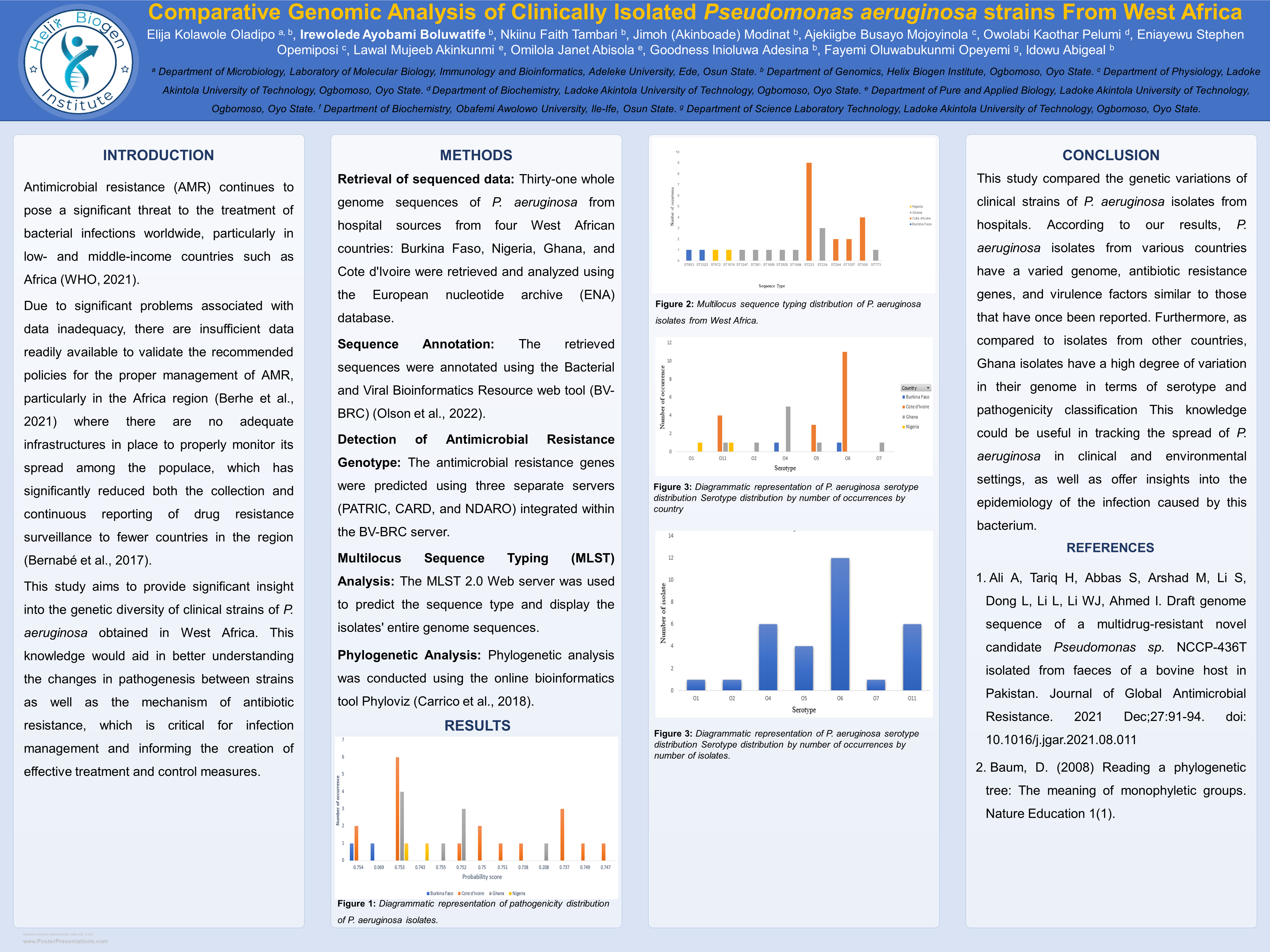Boluwe Irewolede
Conference 2024 Poster
Poster Title
Comparative Genomic Analysis of Clinically Isolated Pseudomonas aeruginosa strains From West Africa
Authors and Affiliations
Elija Kolawole Oladipo *, a, b, Irewolede Ayobami Boluwatife b, Nkiinu Faith Tambari b, Jimoh (Akinboade) Modinat b, Ajekiigbe Busayo Mojoyinola c, Owolabi Kaothar Pelumi d, Eniayewu Stephen Opemiposi c, Lawal Mujeeb Akinkunmi e, Omilola Janet Abisola e, Goodness Inioluwa Adesina b, Fayemi Oluwabukunmi Opeyemi g, Idowu Abigeal b,
a Department of Microbiology, Laboratory of Molecular Biology, Immunology and Bioinformatics, Adeleke University, Ede, Osun State.
b Department of Genomics, Helix Biogen Institute, Ogbomoso, Oyo State.
c Department of Physiology, Ladoke Akintola University of Technology, Ogbomoso, Oyo State.
d Department of Biochemistry, Ladoke Akintola University of Technology, Ogbomoso, Oyo State.
e Department of Pure and Applied Biology, Ladoke Akintola University of Technology, Ogbomoso, Oyo State.
f Department of Biochemistry, Obafemi Awolowo University, Ile-Ife, Osun State.
g Department of Science Laboratory Technology, Ladoke Akintola University of Technology, Ogbomoso, Oyo State.
Abstract
Background
The occurrence of antimicrobial resistance is reported to have steadily increased and worsen over the year. Due to significant problems associated with data inadequacy, there are insufficient data readily available to validate the recommended policies for the proper management of AMR, particularly in the Africa region where there are no adequate infrastructures in place to properly monitor its spread among the populace. Pseudomonas aeruginosa is an opportunistic pathogen commonly associated with hospital-acquired infections, particularly bloodstream infections, urinary tract infections, and pneumonia, resulting in considerable morbidity and mortality. This study aims to provide significant insight into the genetic diversity of clinical strains of P. aeruginosa obtained in West Africa.
Methods
Thirty-one whole genome sequences of P. aeruginosa from hospital sources were retrieved and analyzed using the European nucleotide archive (ENA) database (https://www.ebi.ac.uk/ena/browser/home) as of January 27, 2023. The entire sequence were annotated using the Bacterial and Viral Bioinformatics Resource web tool (BV-BRC) to discover the genes that impart a unique trait on the organism. Pseudomonas aeruginosa serotyper (PAst) online service was used to determine the serotype the isolates belong, MLST 2.0 Web server was used to predict the sequence type, and phylogenetic analysis was carried out using the online bioinformatics tool Phyloviz.
Results
From our study, twenty-seven genotypes were observed to be common within the genome of all the isolates, twenty-one genotypes were found to share among isolates from three different countries, while three genotypes were most common to isolates from two different countries in our prediction. The predicted phylogenetic tree revealed similarities and grouping between isolates from Burkina Faso, Ghana, and Cote d’Ivoire, while isolates from Nigeria were considerably far from the original ancestor, indicating a divergence in their genetic makeup.
Conclusions
The findings of this study may be utilized to unravel multiple mechanisms that will aid in the fight against virulent and drug-resistant strains.


Leave A Comment